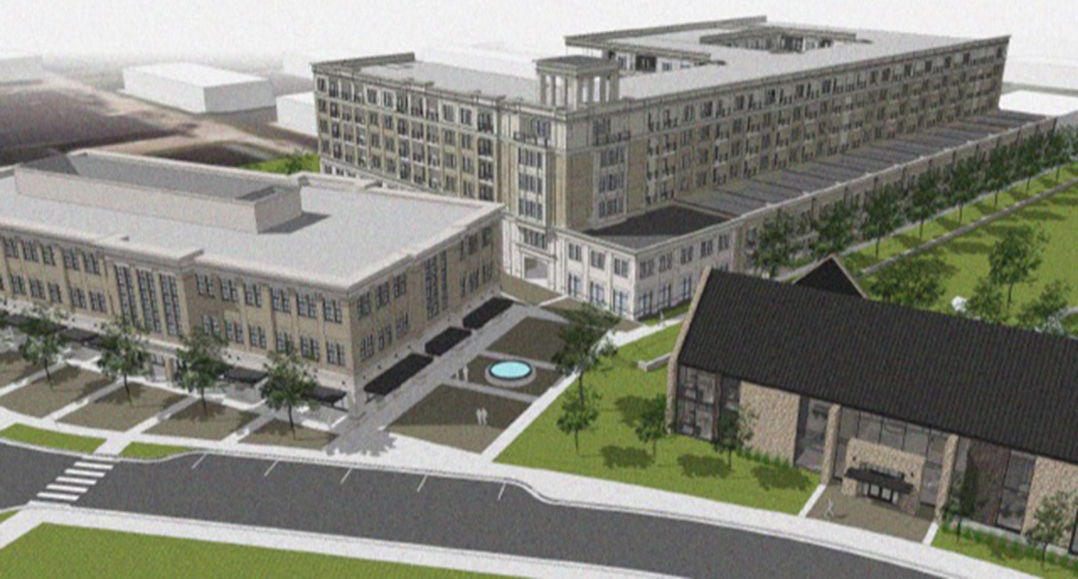After a lengthy discussion and public hearing, the Carmel Board of Zoning Appeals on July 25 approved three of six variances requested for a mixed-use development proposed to replace a vacant building at 210 3rd Ave. SW and rebuild two homes – on reduced lot sizes – in the Johnson Addition neighborhood behind it.
The $133 million project by PST Land Holdings and Pure Development Capital on 5.2 acres is proposed to include 244 luxury apartments in a six-story building, an 80,000-square-foot Merchants Bank headquarters expansion, a 37,000-square-foot headquarters building for Pure Development, a parking garage and two single-family homes to replace two existing homes on Emerson Road that back up to the project.
Variances approved are:
- 85 percent lot coverage for parcels with multi-family and office uses (allowable maximum is 80 percent)
- Hardscape improvements and a parking lot in portions of bufferyards for parcels with multi-family and office uses
- Transportation plan compliance (essentially leaves adjacent roadways unchanged)
Variances denied are:
- Permitting office use in residential zoning (part of a proposed office building is in the backyard of an existing home with residential zoning)
- 5.7-foot residential rear yard setbacks (allowable minimum is 20 feet)
- A bufferyard width of 15 feet (allowable minimum is 30 feet)
The petitioner previously withdrew variance requests for residential lot sizes to be smaller than the minimum permitted in city code for the area, 10.2-foot front yard setbacks for the homes (minimum allowed is 35 feet), and 39 percent lot coverage for the residential parcels (35 percent is allowable maximum).
Hours before the meeting, the petitioner removed plans for a family office building proposed behind the rebuilt homes. Brian Tuohy, an attorney representing the petitioner, said that portion of the site is now designated as green space, but he said developers may choose to build on it at a future date.
“I don’t want to commit that it would never be developed,” Tuohy said. “We’re not seeking approval of any improvements on (that parcel) at this point other than the sidewalks.”
During the public hearing, several residents who live near the proposed development – many wearing stickers simply stating “NO” — remonstrated against it. Paula Pearce is among the newer residents of nearby Wilson Village, and she is concerned about how the project would change the character of the area.
“You look at that picture (of the proposed project), do we need that there?” she said. “I think we’re all on board that something needs to be done with that AT&T building, but if you completely take over that neighborhood, you’re going to be saying goodbye to that tremendous history.”
Attorney Greg Schrage spoke on behalf of residents of Johnson Addition, which is one of Carmel’s oldest neighborhoods. He said the neighbors aren’t opposed to the site being redeveloped, but as proposed he believes it benefits the commercial aspects of the project at the expense of the neighborhood.
Two people spoke in support of the project: a resident who believes it will be good for Carmel’s economy and for pedestrians and bicyclists, and Carmel Redevelopment Commission Director Henry Mestetsky, who said the city’s continued investment in redevelopment helps strengthen surrounding neighborhoods. He described the project as a “long-planned public private partnership between the city and developer.”
Tuohy said he doesn’t expect the project and its variances to adversely affect home values and expects the rebuilt homes to sell for close to $1 million. Pure Development purchased the two homes proposed to be replaced for $500,000 and $450,000, he said.
During the meeting, BZA alternate Paul Reis filled in for regular member Kent Broach, who recused himself from the discussion. Broach’s employer previously represented one of the petitioners on an unrelated matter.
Earlier this year, the Carmel City Council approved a tax increment financing bond up to $20.5 million to help support the project. Developers will receive 95 percent of the TIF revenues for the life of the bond, up to 25 years.





